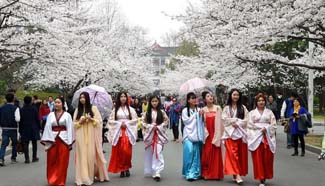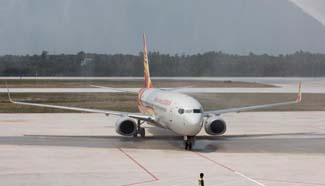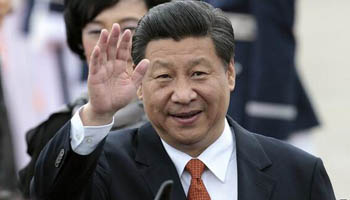Building a strong army through reform – how Chairman Xi Jinping and the Central Military Commission mapped out deepening defense and military reforms
Only by reforming and striving to become strong can a country generate strength to leap forward.
And only by self-innovation can an army earn an opportunity to gain the upper hand.
November 24, 2015 was an historic day for the people’s army. At the military reform conference of the Central Military Commission (CMC) in Beijing, Xi Jinping, General Secretary of the Communist Party of China (CPC) Central Committee, China’s President and Chairman of the CMC, ordered the implementation of deeper national defense and military reforms as part of a comprehensive strategy to build a strong army and to unswervingly follow the path of building a strong military with Chinese characteristics.
This calls for efforts to grasp the historic opportunity and plan the future of the military. With a strong sense of responsibility, great strategic operations research and firm determination, Chairman Xi and the CMC began a journey to lead the three services to reform themselves and become a strong army.
A test that could shape the future
Reform is the dominant feature of modern China as well as the CPC.
On Nov. 15, 2012, when the first plenary session of the 18th CPC Central Committee decided the composition of the CMC, Xi convened the first CMC meeting and made a clear pledge to always forge ahead with the spirit of reform and to strive to gain the advantage in military competition.
Reform and innovation have been an inexorable law since ancient times for all countries wanting to build a strong military.
The development of the people’s army is a story of reform and innovation. From the Agrarian Revolutionary War, when a series of principles, including “the Party commands the gun”, were created, to the War Against Japanese Aggression, when downsizing was adopted; from the early years of New China, when the system and organization were adjusted several times, to the reform and opening-up period, when troop numbers were cut by a million…. Under the leadership of the CPC, the army has gone from small to large, from weak to strong and from victory to victory, through ceaseless reform and innovation.
Since the 18th CPC National Congress, Chairman Xi and the CMC have paid great attention to strategic issues such as adapting to fundamental changes in international strategic and national security situations, and building a strong military commensurate with China’s international status, and its national security and development interests.
Great changes have brought great challenges. To plan for a strong military, one must correctly grasp global trends and military developments.
Currently, profound changes are taking place in the international situation and the global order and governance system, while the balance of power is seeing an adjustment that is unprecedented in modern times. In this historic transition, a military revolution, featuring a struggle for strategic initiative, has seen all major countries adjust their security and military strategies and their military organizations at a speed, scope and depth unknown since the end of World War II.
“When hundreds of barges compete for advancement, it is the one that spares no effort in rowing that can win.” Military development is the most competitive field with the greatest number of rivals, and the most dynamic and demanding of innovative spirit. Xi, with his grand strategic vision, has repeatedly told the whole army that the new military revolution has provided a once-in-a-lifetime opportunity. But it is a fleeting opportunity, which will bypass anyone who is too conservative, too self-satisfied or too inward-looking, casting them at a disadvantage. Refusing to reform is not an option, nor is reforming slowly.
The big picture calls for great responsibility. To plan for a strong military, we must study and advance it from the perspective of the great Chinese dream of national rejuvenation.
The Chinese dream calls for the dream of a strong military. Our military is in a transition from large to strong. To defend and benefit from the important period of strategic opportunity and realize the two centenary goals as well as the Chinese dream, a strengthened national defense and a strong military are inevitable. Only with strong armed forces as the ballast can the ship of socialism with Chinese characteristics break waves. Since the 18th CPC National Congress, the CPC Central Committee has released the strategic layout of the “Four Comprehensives,” which include national defense and military reforms as important supports.
A strong nation calls for a strong military, while a strong military calls for reforms. “Once a country’s military lags behind, its national security will be fatally threatened. I often read historic materials about modern China, and when I see how lagging behind leaves a country vulnerable to attack, I feel deep pain in my heart!” said Xi. He noted that defense and military reforms are an important part of comprehensive reform, as well as an important symbol of comprehensively deepening reform. The military must keep pace with the CPC Central Committee and unswervingly advance all reforms with the spirit of “cutting a road in a mountain and building a bridge to cross a river.” Everyone must have a sense of responsibility.
Grand goals call for great transformations. To plan for a strong military, we must focus on the target under the new circumstances of the CPC.
After more than 80 years of hard work, trials and hardship, the modernization of the People’s Military today has leapfrogged ahead, with national defense and military building at a new starting point. But compared with the ultimate target, the military still faces many conflicts and problems and falls short in many aspects, such as scarce capacity in digitalized combat, a wide gap between the current military modernization and its requirement to protect national security and a disparity with international levels. How a capable army that can win wars will break down historic barriers, keep its blade sharp and stand undefeated is a question that needs to be answered.
Only reformers can move forward and only innovators can become strong. In a pointed remark, Xi said, “Concerning military building and reform, what I consider most is that when the Party and the people are in need, can the army always follow the absolute leadership of the CPC and fight and win wars, and can commanders at various levels lead their soldiers and command them?” Without reform, the military cannot fight and win wars, added Xi. To implement the goal of a strong army and military policies and to fulfill its duties, the military’s ability to cleanse and improve itself and to innovate must be strengthened.
The deeper the thinking goes, the more resolutely one can act.
From raising the strong military goal of the Party under new circumstances to the holding of the political work conference in Gutian, at which the political principle of leading the army was consolidated; from formulating military policies under new circumstances to deepening military management in accordance with the law and strict standards…. Since the 18th CPC National Congress, Xi and the CMC have planned as a whole the transformation, modernization and normalization of military building, arranged the deployment of the military and deliberated on economic construction and defense building, laying out a series of major strategic plans and designs, opening new realms in Marxist military theory and the practical development of a modern Chinese military.
To implement and realize the plans, we must follow the path of reform, seek reform solutions and carry out reform measures.
At all the important meetings, inspection tours and symposiums, Xi has talked about striving to become strong through reform and building a strong military through reform:
On the matter of deepening national defense and military reforms, we face a rare opportunity and we must seize it. It is a major test that we cannot avoid – the military must have passable answers that can meet the expectations of the CPC, the people and history.
The more difficult it is, the more resolute and courageous we must be, without being hesitant and overcautious. If the whole military is of one mind, dares to tackle tough problems and to cross turbulence, there will be no ordeal of fire that we cannot pass.
Reform is not a change of direction and not a change of color. Reform is to better insist on the CPC’s absolute leadership of the army, to better stick to the nature and purpose of the army and to better inherit the honorable traditions and work styles of the army. On these fundamental political principles, not a single error or subversive mistake can be tolerated.
The key to deepening defense and military reforms is to seize the target of building a strong army and to view the reforms with the target in mind, to lead the reforms with the target and to advance reforms focusing on the target.
Deepening defense and military reforms is systematic; not tweaking or small adjustments. The relevance and links between reform measures must be considered for their mutual progress, having a systematic and comprehensive effect.
The general requirement of being “active and reliable” must be obligatory. Advances should be courageous, but the scope should be steady. Strategically, we should be brave, while on tactics we should advance incrementally and consolidate our gains, achieving big wins by accumulating small gains.
The mentality and the direction are ever clearer.
In November 2013, the third plenary session of the 18th CPC Central Committee made an overall arrangement for comprehensively deepening reforms. Discussing the decision framework of the meeting, Xi solemnly proposed to adopt national defense and military reforms in the overall reforms and elevate them to the will of the CPC and an act of the nation.
It was the first time in history a CPC plenary session had adopted independent defense and military reforms. The promise and command for deepening defense and military reforms demonstrated the resolve of Chairman Xi and the CMC.
To plan because of the situation, to move in response to the situation and to act according to the situation are requirements for realizing the Chinese dream and the dream of a strong army. They are also an inevitable path to strengthen the army and a key move to decide its future.










